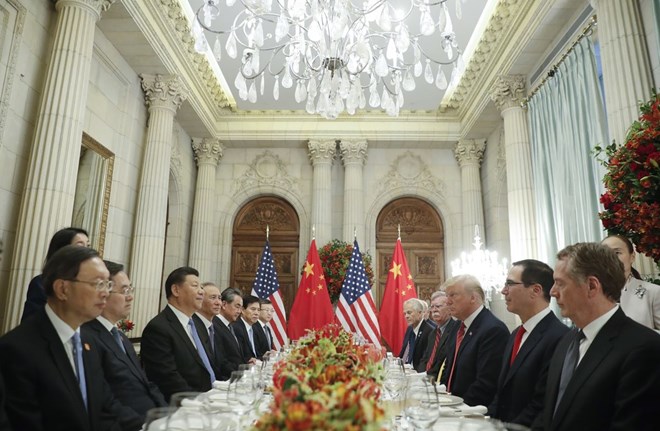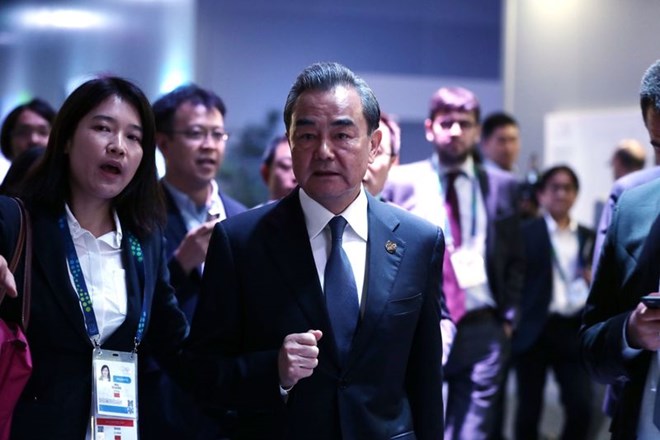
Sunday December 2, 2018
Saleha Mohsin, Jennifer Epstein, Peter Martin and Nick Wadhams

Donald Trump and Xi Jinping at a dinner meeting on Dec. 1 Photographer: Pablo Martinez Monsivais/AP
U.S. President Donald Trump and Chinese President Xi Jinping agreed to keep their trade war from escalating with a promise to halt the imposition of new tariffs for 90 days as the world’s two largest economies negotiate a lasting agreement.
The truce between the U.S. and China emerged after a highly anticipated dinner Saturday between Trump and Xi on the sidelines of the Group of 20 summit in Argentina. The leaders agreed to pause the introduction of new tariffs and intensify their trade talks, Chinese Foreign Minister Wang Yi told reporters hours later in Buenos Aires.
“Both sides believe that the principled agreement reached between the two presidents has effectively prevented the further expansion of economic frictions between the two countries,” he said.
The White House called the meeting “highly successful,” saying the U.S. will leave existing tariffs on $200 billion of Chinese goods at 10 percent and refrain from raising that rate to 25 percent as planned on Jan. 1. In exchange, the U.S. wants an immediate start to talks on Trump’s biggest complaints about Chinese trade practices: intellectual property theft, non-tariff barriers and cyber theft.
After 90 days, if there’s no progress on structural reform, the U.S. will raise those tariffs to 25 percent, White House Press Secretary Sarah Huckabee Sanders said in a statement. China also agreed to boost its purchases of agricultural and industrial goods to reduce its trade imbalance with the U.S., she said.
“This was an amazing and productive meeting with unlimited possibilities for both the United States and China,” Trump said in the statement. “It is my great honor to be working with President Xi.”
Investors have been eager for signs of a progress toward keeping an already costly trade dispute from spiraling into a new and broader cold war. White House economic adviser Larry Kudlow said that the meeting went “very well” in a brief comment to reporters as the Trump delegation left Buenos Aires for Washington.
The outcome gives both sides enough to boast of a win without resolving the fundamental differences between them. China gets a delay on additional tariffs, while the U.S. gets greater purchases of agriculture goods while retaining leverage to push for more structural changes to the economy.
“Neither side got their maximum demands and it’s not the first time in U.S.-China relations that both sides claim victory,” said Michael Pillsbury, a senior fellow at the Hudson Institute and a defense official under presidents including Ronald Reagan and George W. Bush. “Both sides avoided the worst-case scenario.”
What Our Economists Say..
Ahead of the G-20, the U.S. planned to increase tariffs on $200 billion in Chinese goods from 10% to 25%, effective Jan. 1. That increase has now been deferred. Based on our calculations, tariffs at 25% would have meant a 0.9 percentage point drag on China’s GDP growth. Keeping tariffs at 10% will mean the drag stays at 0.5 ppt.
-- Tom Orlik, Bloomberg Economics.
The meeting ran longer than scheduled, ending after more than two hours. At the start of the dinner, Trump struck an optimistic note.
“My relationship is very special, the relationship that I have with President Xi,” Trump said as the two men were seated.
Through a translator, Xi said that “only with cooperation between us can we serve the interest of global peace and prosperity and that is why I look forward to this meeting.”
The meeting was the first face-to-face encounter between the leaders in more than a year, a period that saw Trump impose tariffs on billions of dollars in Chinese imports in a bid to force Beijing to halt trade practices the U.S. considers unfair. Trump had warned that a disappointing outcome could prompt more U.S. tariffs.
In other key results from the talks, the U.S. promised to uphold the one-China policy, Wang said, while China threw its support behind further meetings between Trump and North Korean leader Kim Jong Un.
The White House said that Xi would consider approving a possible $44 billion deal for Qualcomm Inc. to purchase NXP Semiconductors NV if it’s brought to him again. It also said China agreed to designate the synthetic opioid fentanyl, which has been linked to an epidemic of overdose deaths, as a controlled substance -- a move that would expose its sellers to the maximum penalty under Chinese law.

Wang YiPhotographer: Alejandro Pagni/AFP via Getty Images
The dinner was moved up by about an hour after U.S. leader’s schedule opened up on Saturday. He had already canceled a planned meeting with Russian President Vladimir Putin, and then scrapped an afternoon press conference out of respect for the family of former U.S. President George H.W. Bush, who died late Friday night.
Other attendees on the U.S. side included Treasury Secretary Steven Mnuchin, Secretary of State Michael Pompeo, U.S. Trade Representative Robert Lighthizer, China hawk and senior adviser Peter Navarro, National Security Adviser John Bolton and Trump’s son-in-law, Jared Kushner, who’s a senior adviser to the president.
Trump and Xi dined on some local specialties, including grilled sirloin with red onions, goat ricotta, and dates. For the first course, the attendees had a seasonal vegetable salad with a basil mayonnaise dressing, and for dessert, they were served caramel rolled pancakes with crispy chocolate and fresh cream, according to the White House.
— With assistance by Kevin Hamlin, and Miao Han